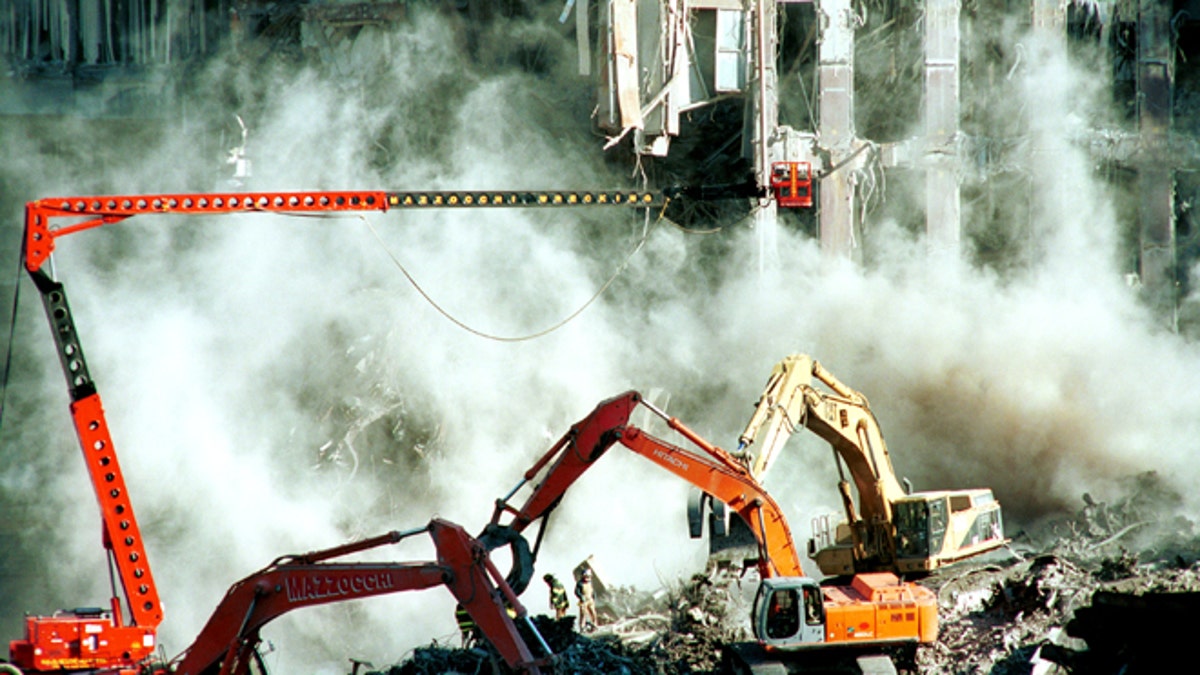
396041 01: Weeks after the World Trade Center attacks, firefighters keep clearing the rubble October 17, 2001 in New York. A section of the facade from the south tower of the World Trade Center was brought down with a cloud of dust Tuesday as cleanup of the disaster site entered its sixth week. (Photo by Shaul Schwarz/Getty Images)
Workers who cleaned up after the 9/11 terrorist attacks and others who responded in the wake of the tragedy will begin a push on Tuesday to get the government to continue paying for their health care.
That is when lawmakers from both the House and Senate will reintroduce the James Zadroga 9/11 Health and Compensation Act, which was named after a New York City police officer at Ground Zero who died of a respiratory disease in 2006.
The Act has two parts that are set to expire this year and next. The reintroduced bill would extend health care and related compensation to workers and residents of the areas surrounding the attack sites for an additional 25 years, if approved by Congress.
Despite patriotic feelings the first responders inspire in Americans, the original bill was only narrowly passed in 2010.
With bipartisan support, congressional leaders are optimistic the bill will pass. But advocates learned from their last experience in Washington that contention is par for the course.
“They are playing politics with people’s lives,” said Alex Sanchez, one of the responders most closely involved in the passage of the Act and the head of United We Stand. His group advocates for Latinos who were at the sites impacted by terrorism that day. He estimates that there were about 6,000 temporary workers, 2,000 of whom are undocumented.
Sanchez recalled being one of about 500 workers who were dispatched by ABM, a building management company, to help clean up Ground Zero.
He worked, without a mask, for 12 to 14 hours a day. He and other temporary workers received limited pay but were motivated by sentiment to clear the remnants that were a painful reminder of the devastation in New York City, he said.
Today Sanchez coughs intermittently and struggles to catch his breath when he speaks, a side effect of exposure to contaminants found at the site, he says.
He takes 14 pills a day and has been hospitalized for diverticulitis (an intestinal infection). He has respiratory issues and sinusitis and also suffers from post-traumatic stress disorder (PTSD). Muscular disorders make it hard for him to move around.
“It’s pretty hard living with 9/11 diseases,” he said. “First of all, we look OK. We aren’t missing a limb, we can walk—but our lives are very much a nightmare.”
The new bill would likely cover medical expenses through 2041, when the average age of the responders would be 75, nearly the average life expectancy, pointed out John Feal, another responder who heads the Feal Good Foundation, which was involved in the passage of the original act.
The reauthorization bill which is being cosponsored by a host of lawmakers, including U.S. senators Kirsten Gillibrand (D-N.Y.) and Kelly Ayotte (R-N.H.).
If passed, the bill would also continue the September 11th Victim Compensation Fund that gives money to responders and survivors for injuries or medical issues resulting from the attacks and their aftermath. So far, more than 10,549 people have been deemed eligible to receive money from the fund and about half that number have submitted claims. Of those, 4,415 have been settled and the total amount dispersed through March 31 is just over $1 million.
The World Trade Center Health Program would also continue to provide medical care and treatment to responders who worked at any of the sites that were targeted on 9/11. Nearly 71,000 people are in the government funded program; 58,924 of those received treatment in 2014.
The number of afflictions that are covered are limited. There are a variety of mental health conditions, certain cancers (which were added in 2012), digestive and respiratory problems and some musculoskeletal disorders
Other conditions may be added as more effects come to light. For example, rheumatoid arthritis is not currently covered, but a recent study indicates that workers exposed to the debris are at higher risk for this autoimmune affliction.
The original bill was nearly killed in 2010 by a filibuster. The bill was resuscitated after the total cost was reduced by $4.2 billion, which limited the length of care and compensation that could be distributed and put a cap on attorney’s fees used to file claims. The money to fund the measure comes from fees collected by foreign countries for certain services and from certain travelers.
Sanchez and Feal have traveled to Washington, D.C., hundreds of times, learning which ropes to tug to get attention for workers and responders who don’t have lobbyists in their corner. Their trips aren’t over, but although they are costly and traveling for them can be trying, they are the last things they’d give up.
After all, as they see it, lives are at stake.“We’re going to challenge Congress … to do what’s morally right,” Feal told FNL. “We’ll see who’s a human and an American before they are a Republican and Democrat. Will there be a fight ahead of us? Absolutely.”
